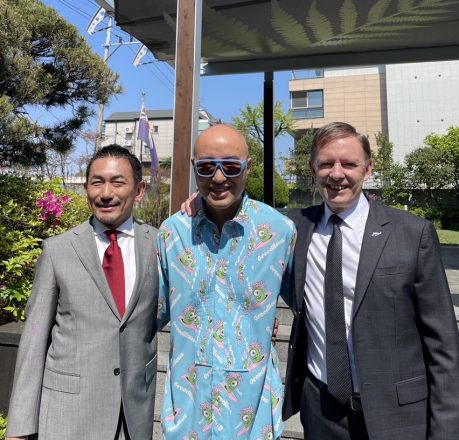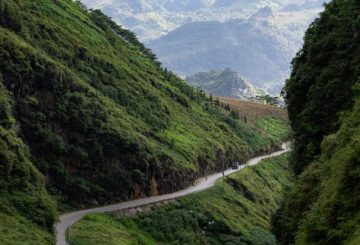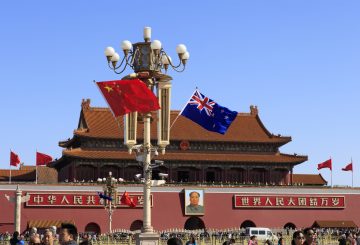New Zealand’s Ambassador to South Korea, Philip Turner, is leading the way on LGBTQ rights in the country. He is the first diplomat with an officially recognised same-sex spouse in Korea, the first diplomat to meet the President with a partner of the same sex, and probably the only diplomat ever to appear in a K-pop music video. Ambassador Turner spoke with Hongi about diversity in South Korea and the changing views on the LGBTQ community.
“South Korea is a fairly conservative society, especially on issues of sexual orientation,” Philip says.
“We have been here for four years and we know hardly any ‘out’ gay or lesbian couples. It’s very unusual to be out to anyone, except for immediate family, because it’s just so hard.”
Philip and his husband Hiroshi have been together for 28 years. They moved to Seoul in 2018 when Philip took up the ambassadorial post.
“When I first arrived, I went to meet President Moon Jae-in for the official credentials ceremony at the Blue House. This is where you hand over your [diplomatic] credentials and the President receives you – it’s all very formal.
“The protocol was that ambassadors could bring one family member. I thought ‘that’s great – I can bring Hiroshi’, and they said ‘no, you can’t’. Because they didn’t recognise marriage between same-sex couples, he couldn’t come to the ceremony.”
So, Philip attended the ceremony alone.
“But, we made a point, as New Zealand, of protesting this and saying that this needs to change. It’s certainly not the way that New Zealand treats people,” Philip says.
“And to their credit, the Korean government changed their mind. I suspect that President Moon had a direct hand in that decision.”
In 2019, Hiroshi was issued an A1 visa, the appropriate visa for spouses of diplomats. He was the first same-sex spouse ever to receive the visa. Philip and Hiroshi went back to the President’s residence together in 2019 to meet President Moon Jae-in, making history in the process.
“What’s particularly gratifying is that there are now at least three other LGBTQ ambassadors with recognised spouses in Korea and numerous other diplomats who have been able to bring in same-sex partners.
“Several people have said ‘thank you, if that decision had not been made, we would not be here’”. I hope it is part of a broader trend of Korea becoming more diverse and tolerant.”
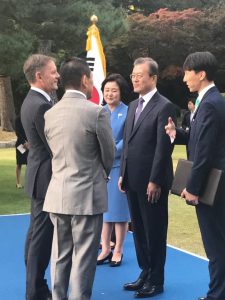
Philip says that a current challenge in South Korea is the anti-discrimination bill, which has been in front of the National Assembly for two years. The bill is similar to New Zealand’s 1993 Human Rights Act and would outlaw discrimination on a range of criteria, including gender, religion, ethnicity and sexual orientation.
“The LGBTQ part of that is particularly politically sensitive here and there is a lot of opposition.
“Even the progressive government under [President] Moon felt unable to push it through the National Assembly. It’s still sitting here, but we’ll see what happens with the new government.”
The sensitivity towards LGBTQ issues was highlighted at the Seoul Pride event this year. The organisers sought permission from the city government to host events over a week. Although their application wasn’t rejected outright, it was only granted for a single day.
“So, it was a compromise decision. That gives you an idea of how ambivalently the issue is seen by authorities,” Philip says.
However, attitudes towards the LGBTQ community are changing in South Korea. A 2019 poll by the Pew Research Centre showed that 44% of South Korean respondents agreed that homosexuality should be accepted by society. In 2007, this figure was only 18%. The increase in positive responses to this question was greater than that seen in the UK or Canada over the same period. Women in their 20s and 30s have the most progressive attitude, with 60% of respondents in this demographic agreeing that society should accept homosexuality, bisexuality and gender reassignment, according to a 2021 poll by Korea Research Ltd.
Philip says that he has noticed a change during his four-year tenure.
“When I first arrived, the protesters outnumbered the pride folk at the parades. This year, I think it was the opposite. There were more in the pride community than outside.
“And we’re now seeing pride events blossoming around Korea and most provincial cities now have a pride event every year.”
During the city of Incheon’s first pride event in 2018, thousands of protesters blocked the parade and physically harassed the participants. However, Philip says that this level of disruption is becoming less common.
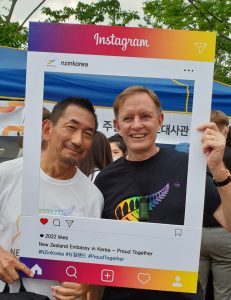
South Korea is also beginning to see more diverse characters on TV. For example, Itaewon Class, a popular 2020 drama series, features a transgender character and an African character. This year, the first gay dating reality show, Man’s Romance, aired on Korean TV, although not on a mainstream channel. This was followed by a second show, Marry Queer, which also features dating gay couples.
“It is starting to happen,” says Philip, “but I think not nearly so much as we would hope, or as you would see in other countries.”
Philip and Hiroshi are playing a part in advocating for the acceptance of the LGBTQ community. They hosted a reception at the New Zealand Residence before this year’s Seoul Pride event to support diversity, equality and tolerance. Nearly 200 people attended, from senior government officials through to drag queens.
Earlier this year they made an appearance in a gay-themed K-pop music video. The video stars the iconic gay South Korean actor and gay rights advocate Hong Seok-cheon (also known as ‘Top-G’) and includes a scene of Philip and Hiroshi holding hands and dancing outside the New Zealand Residence.
“When this opportunity came up, naturally we had to seek Wellington’s approval,” Philip says.
“And they were like, ‘OK… so you want to appear in a gay-themed K-pop video? Well, let us think about that for a bit.’” But, they were very supportive of the project.
“We saw this as an opportunity to represent modern New Zealand’s attitudes to diversity in a fun way to a contemporary Korean audience.”
Philip says that they were nervous before the release of the video, but the response was very positive. It led to a number of interview requests, and he appeared on the K-pop Con-Tour TV show, produced by South Korea’s Arirang TV. The show made two hour-long programs featuring New Zealand.
New Zealand legalised same-sex marriage in 2013, the first country in the Asia-Pacific region to do so. Philip says that New Zealand’s progressive approach to issues of diversity is viewed favourably from the outside.
“There is a lot of interest. We often get invited, as the embassy, to speak to the National Assembly, to the media, to seminars, on these sorts of issues. I think people appreciate that New Zealand is a bit of a trailblazer.”
He emphasises that New Zealand has been on a very similar journey to the journey that South Korea is now on.
“When I first joined the Ministry of Foreign Affairs, male homosexual acts were illegal in New Zealand… Then there were a series of milestones, including the Human Rights Act and our own comprehensive anti-discrimination legislation in the early ‘90s. That set up subsequent changes, including the Civil Union Act (2004) and then, eventually, the same-sex marriage act. At each point in New Zealand’s history, these things were controversial and there was plenty of opposition.
“Social change is not easy and all societies have their own characteristics. New Zealand today is by no means perfect, and there are still plenty of challenges and issues that we face.
“All we can really do is tell our story and hope that it will be relevant to the situation that the Koreans are going through at the moment. But, what happens in Korea is something that the Korean people will need to decide from themselves.”
Article by Hayden Peacock
Watch the “K-Pop Star” Music Video featuring Ambassador Turner:

















































